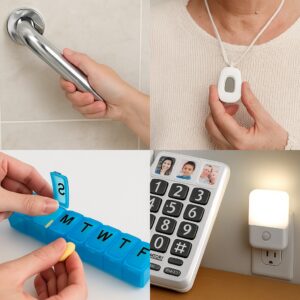
Getting older doesn’t mean life has to get harder. In fact, there are tons of small changes that can make a huge difference in keeping things simple, safe, and more comfortable for seniors. Whether it’s something to help with moving around, remembering important stuff, or getting help fast when there’s an emergency, these little things can really add up.
It’s not about taking away independence. It’s about making it easier to keep it.
Simple Tools That Make Moving Around Easier
One of the biggest challenges many seniors face is moving safely through their homes. Balance might not be what it used to be. Muscles aren’t always as strong. And even everyday tasks like getting out of bed or reaching into a cabinet can feel tricky.
That’s where grab bars come in. These are those strong bars that can be attached next to a toilet, inside a shower, or along hallways. They give extra support when standing up, sitting down, or just walking through the house. Non-slip mats are another small thing that makes a big difference—especially in bathrooms or kitchens, where floors can get slippery fast.
Another helpful change is switching regular doorknobs and faucet handles to lever-style ones. These are easier to push or pull, especially for hands that have arthritis or don’t grip as well anymore.
Some families also use raised toilet seats or recliners that help with standing up. These things don’t take up much space, but they can make someone feel a lot more confident moving around.
When Memory Isn’t What It Used to Be
For many seniors, memory gets a bit fuzzy over time. Forgetting small things like where the keys went or what day it is might happen more often. And while it’s normal to forget things once in a while, forgetting something important—like taking medicine—can be dangerous.
That’s where reminders and organizers can help. Pill organizers with sections for each day (or even different times of day) make it easier to stay on schedule. Some of them even have alarms that beep or lights that flash when it’s time to take a pill.
Digital clocks with big, clear displays that show the date, time, and even if it’s morning or night can also be a big help. Some people hang up weekly calendars or whiteboards with simple notes to help keep track of things like doctor visits or meals.
It’s all about setting up simple systems that take the pressure off trying to remember everything.
Getting Help Fast—Even Without a Phone
Emergencies can happen at any time, and phones aren’t always within reach. If someone falls, gets dizzy, or feels chest pain, they might not be able to make a call.
That’s why a Life Assure medical care alert system can be such a smart idea. It’s a small device that’s worn around the neck or wrist, with a button that sends for help instantly. Whether it’s a fall or something more serious, this kind of system connects to trained people who can get the right help fast—even if the person wearing it can’t talk.
It brings peace of mind not just to the person using it, but to their family too. Knowing that someone is always ready to respond makes everyone feel more secure. And since some alert systems work outside the house too, it helps seniors feel safe when they’re on walks or visiting a friend.
Making Daily Tasks Less Frustrating
Even small daily tasks can feel frustrating when hands aren’t as steady or eyes don’t see as clearly. That’s why simple tools designed for seniors can make a big difference.
Big-button phones, for example, are easier to see and use. Some even have photos instead of numbers, so calling a loved one is as easy as pressing their picture. Remote controls with fewer buttons or voice control features can make watching TV way less confusing.
In the kitchen, things like easy-grip utensils, electric can openers, and jar openers can help keep cooking fun and safe. Using kettles that stop boiling automatically, or microwaves with simple controls, can reduce the chance of burns or accidents.
Motion-sensor lights are another small thing that helps a lot. These turn on automatically when someone walks into a room. That means no fumbling for a light switch in the dark—especially useful at night when getting up for a bathroom trip.
Staying Connected Without the Tech Headache
Loneliness is a big problem for many seniors, especially those who live alone or far from family. Staying connected helps people feel happier, but not everyone is comfortable using a smartphone or computer.
Luckily, there are super simple tablets made just for seniors. Some have big icons, easy settings, and can do video calls, show photos, and even play games that keep the brain active. These tablets are built to be stress-free—no complicated logins or apps to figure out.
Another easy option is a digital photo frame that can get new photos sent to it from family. It keeps seniors feeling connected, even if visits aren’t super often. Seeing new photos of grandkids or family trips can brighten someone’s day.
When It Feels Good to Ask for Help
One of the hardest things for seniors is asking for help. It can feel like giving up control or showing weakness. But the truth is, using tools and devices that make life easier isn’t giving up—it’s smart. It means choosing safety and comfort so there’s more energy left for doing what really matters.
A lot of seniors want to stay in their homes as long as possible. With the right little changes, they absolutely can. Whether it’s a grab bar in the bathroom, a reminder for medicine, or a button to press in case of an emergency, these things aren’t taking away freedom—they’re protecting it.
Here’s What Really Matters
When it comes down to it, the little things that make life easier for seniors are actually big things. They bring safety, peace of mind, and independence. They help people keep doing the things they love without constant worry.
No one should have to feel unsafe or alone just because they’re older. And families shouldn’t have to live in fear of “what if” every time the phone rings. Whether it’s something as small as a jar opener or as powerful as a medical alert device, it all adds up.
Helping seniors stay safe isn’t about changing everything. It’s about noticing the little things—and making them better.

